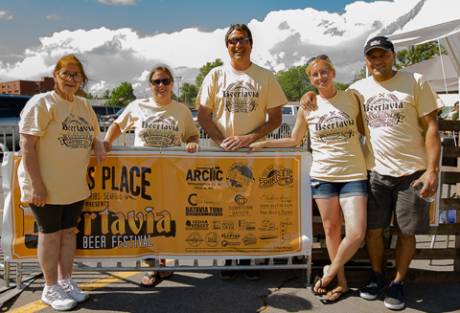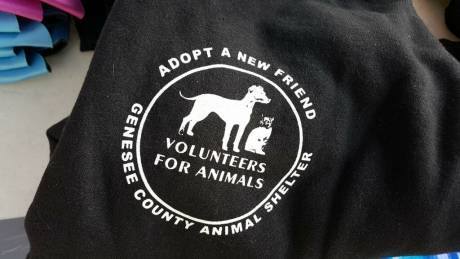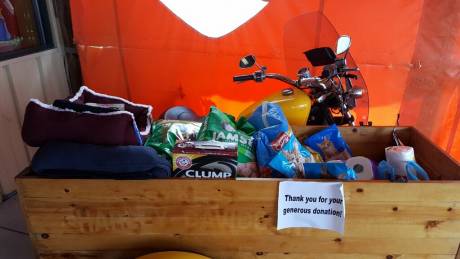Accident with injuries reported on West Main Street Road
A motor-vehicle accident with injuries is reported at 3899 W. Main Street Road, Batavia. It is blocking traffic. Town of Batavia Fire Department and Mercy medics are responding.
A motor-vehicle accident with injuries is reported at 3899 W. Main Street Road, Batavia. It is blocking traffic. Town of Batavia Fire Department and Mercy medics are responding.

Zerin Firoze grew up in Bangladesh in a secular family with a well-educated father, where 90 percent of the people in the country are Muslims.
She wanted to be like any other kid and use YouTube to listen to music, watch tutorials and study for school. But in 2013, YouTube was banned in her home country after an anti-Islam video was posted.
Firoze said something special happened to her that day. Shortly after it was banned, she watched an anti-Islam film, “Innocence of Muslim” after some of her Muslim friends were sharing the video, asking for everyone to report it.
“After having a few conversations back and forth, I went back and read the Qur’an again,” Firoze said. “I used an adult mind this time and I was shocked. Something happened to me that day.”
Her new attitude toward Islam and problems at home set her on a path that brought her to Batavia for college and she hopes will eventually lead to Harvard Medical School.
Firoze was a high school student who started questioning Islam on social media.
“I sat up straight and thought, ‘What is happening in my country?’ ” Firoze said. “2013 was a turning point in my life. I understood that everything I learned about religions is false and man-made.”
She said she knew it was dangerous to question Islam on social media, but she did not stop. Overnight, she lost her Muslim friends.
“I did not know that my own Muslim friends and family that I have grown up with would try to kill me or harm me, just because I chose to question Islam,” Firoze said. “There are several passages in the Qur’an that instruct Muslims to kill non-Muslims. I didn’t want to kill Christians or non-Muslims because I have loving non-Muslim friends and they’re amazing.”
It's been a year since Firoze came to the United States and settled in Batavia.
She has applied for asylum in the United States because she would be killed by Islamic extremists or jailed by the government for speaking out against Islamic extremism.
“I would love to go back to my home country, but I would be killed,” Firoze said. “I don’t think it will change in the next 10 years. It will not get better. It will get worse.”
After speaking out, Firoze received death threats from multiple terrorist groups in Bangladesh. Her name was on a death-threat list from one of the terrorist groups.
“My country is supposed to be a secular country,” Firoze said. “It’s still secular in the Constitution, but a majority of the people happen to be Muslims.”
Firoze said they don’t understand free speech or secular values.
“You cannot call a country secular, then have a state religion,” Firoze said. “It makes no sense.”
When Firoze’s father found out she received death threats from terrorist groups, he told her to get out.
“I fought with my parents a lot and I could no longer take the abuse at home,” Firoze said. “I got in touch with more secular friends from Western countries. I started documenting my miserable condition.”
Firoze received a head injury from her father, which gave her a speech impediment. She told her friends she was forced to drop out of school and was locked in her room. She was not allowed to go out or do anything.
“My mom and dad said they could not keep an outspoken atheist at my house,” Firoze said. “My dad threw me out many times for me wanting an education.”
Her dad was highly educated, so Firoze never understood why her dad denied her education.
“I expected a lot more from my family,” Firoze said.
After her condition continued to get worse, her friends in the United Kingdom set up a GoFundMe to try to rescue Firoze from Bangladesh, after she began receiving daily threats from Islamist terror groups.
“At the time, it became too dangerous for me to stay in Bangladesh,” Firoze said. “I had started receiving rape threats and death threats just for saying something on my own Facebook page.”
It took Firoze almost two years to obtain her five-year visa to the United States, after being denied by the United Kingdom and Sweden for her single marital status, lack of ties to her home country and lack of funding.
Once in America, Firoze began to adjust to the American life. For the first time, she used public transportation by herself, wearing a short skirt.
In Bangladesh, Firoze said women could not take the bus or train alone because they would be harassed, kidnapped and raped. Women are also expected to follow conservative Islamic dress codes, wearing a burka and veil.
“My mom and my aunt started taunting me to be more modest,” Firoze said. “All my high school friends started wearing burka and hijab. I was expected to dress like them and be like them to fit in. I never cared about fitting in.”
The malls in Bangladesh stopped selling jeans, skirts and Western outfits. Firoze was told she should wear the hijab, but she said she finds the concept degrading and insulting.
“So many of my friends and girls in my country are burned and beaten to death, for not wearing the head scarf,” Firoze said. “The hijab is a symbol of oppression.”
One of her best friends in high school was forced into an arranged marriage, which is common in Bangladesh. According to UNICEF, 66 percent of girls are married before the age of 18, and one-third of girls are married before the age of 15. The legal minimum age for marriage is 21 for boys and 18 for girls.
“I raised questions about her marriage,” Firoze said. “I said let her study. Allow her to complete her high school at least. I was the only one brave enough to stand up for her.”
At that point, Firoze was struggling to complete her own education. She was told that because she was a girl, she did not need to study.
“That gave me the courage to speak against Islam, to speak against child marriage, to speak against terrible things happening in my country,” Firoze said. “In 2013, two famous atheists were killed in my country; my country was becoming more Islamic.”
One of her online Bengali atheist friends survived an attack with long-lasting neck injuries after being known an atheist blogger, while another atheist did not.
“In my home country, you can get jailed just for saying something on your Facebook page,” Firoze said. “Ordinary people like you and me have said something on their Facebook page about the government or Islam and they got jailed for it -- or for sharing a cartoon or meme.”
Firoze said there are more important issues that should be dealt with.
“People in my country don’t have access to healthcare or food,” Firoze said. “People are living in the streets. There are so many bigger issues in my country, and the government is after YouTube and Facebook.”
Terrorism has something to do with Islam, Firoze said.
“I have seen this with my own eyes,” Firoze said. “My classmates, friends, they became more radical. They became extremists after going to the mosque regularly. I have seen this in my own family and community.”
Firoze attended a secular school from 7 a.m. until 2 p.m., would have lunch at home, then have Islamic classes from 4 until 6 p.m. She said her mom sent her to Islamic classes to “receive her moral values.”
“I started disliking Islamic school from a young age,” Firoze said. “It was horrible.”
While atheists in Bangladesh have used pseudo names, Firoze has not.
“I am different,” Firoze said. “I have used my real name and my real face. I have spoken against Islamic extreme groups for the last three years with my real name and picture on social media.”
Firoze hopes to be a U.S. citizen in the near future and to attend Harvard Medical School to be a doctor. She started a Skeptics and Secular Humanists Club at college and hopes to spread secularism in the world.
“We must criticize and reform Islam,” Firoze said. “We must protect the rights of Muslims, especially under the Trump Administration. Books and ideas do not have rights. Humans have rights. We must fight Islamic extremism from a place of moral strength and unity, instead of using far-right xenophobia, racism, and bigotry.”
Firoze would like to start a secular club in Batavia if she finds enough like-minded secular or agnostic, atheist people in Batavia. If you would like to collaborate with Firoze, contact her via Facebook.
If you would like to support her efforts, click here.
A mulch fire is reported at Summit Lubricants, 4080 Pearl Street Road, Batavia. Town of Batavia Fire Department is responding.
UPDATE 1:08 p.m.: Fire chief on scene says responders can proceed in non-emergency mode.
Nicholas Edmund Kaiser, 26, of Westbourne Drive, Tonawanda, is charged with felony DWI and felony driving with a BAC of .08 or greater. Kaiser was arrested after arriving at the Genesee County Jail at 1:35 a.m., Sunday, to pick up a friend who had been arrested for DWI earlier in the night. Upon Kaiser's arrive, officers suspected Kaiser of being intoxicated. He submitted to a field sobriety test.
Jamie Ann Dorazio, 24, of Broad Street, Tonawanda, is charged with DWI, driving with a BAC of .08 or greater and failure to obey police officer. Dorazio was stopped at 11:44 p.m., Saturday, following a traffic stop on Sumner Road, Darien, by Deputy Eric Meyer.
Jeffrey Alexander Cardenas II, 26, of Lake Street, Le Roy, is charged with driving while impaired by drugs and failure to keep right. Cardenas was arrested after Deputy Mathew Clor responded to a complaint of a vehicle off the road on Lake Street Road, Le Roy, at 12:18 a.m., Saturday.
David James Leroy, 25, of Sumner Road, Darien, is charged with obstructing governmental administration, 2nd. Leroy was arrested after deputies and troopers responded to a check-the-welfare call at a location on Sumner Road, Darien. Leroy allegedly interfered with the deputies and troopers.
Ronald D. Ashton III, 24, of Bennett Street, Buffalo, is charged with aggravated unlicensed operation, suspended registration and driving to left on crest/grade curve. Ashton was arrested on a warrant for alleged failure to appear in Town of Bethany Court on charges stemming from 2016.
Kelly Ann Kasper, 47, of Judge Road, Alabama, is charged with criminal contempt, 2nd. Kasper allegedly struck a person who was the protected party in an order of protection.
Teshawn Anthony Lang-Smith, 21, of Dellinger Avenue, Batavia, is charged with criminal mischief, 3rd. Lang-Smith is accused of damaging property at a party at 3:15 a.m., Aug. 30, 2014.

Two more pictures from readers. Top one by Doug Yeomans and bottom one by Gary Harding.


Beertavia was this afternoon and it was a funtavia festivia in the suntavia. Sorry for going too far with the puntavias.
Batavia BID (Business Improvement District) hosted a beer tasting with more than 24 craft brews and ciders.

What is normally a blacktop parking lot on Bank Street in Downtown Batavia was transformed into a lawn-covered oasis, with a giant white tent for the nearly 700 people in attendance.
While patrons were tasting the unlimited beer and cider, Ohm’s Band performed a few sets to help keep the atmosphere upbeat.
Batavia Turf donated the grass for the parking lot that had quite a few lawn games as wall as picnic table seating and Adirondack lawn chairs.

The reputation and size of Beertavia is growing every year. So much so, this couple flew up from Chattanooga, Tenn., just for this event. They read about it on beerfests.com and decided it was for the right festival for them. (Picture below.)

Black Creek Cidery won the People's Choice Award for the best drink in the tasting.
Angotti Beverage Corp. helped bring this group of brews together and we are fairly certain all are available locally, if you wan to try some of what was inside the tent or buy some of your favorites to enjoy at home.






Brandi Kaplun sent in this picture of a rainbow over St. Jerome's in Batavia and a reader submitted the rainbow picture below from Darien.

Two older men, one in a red shirt and one in a gray or brown shirt, are reportedly in the parking lot of Flying J in Pembroke selling laptop boxes that contain only newspapers for $100.
Law enforcement is responding.

Stan's Harley-Davidson hosted its annual Hogs for Paws rally today, with proceeds benefiting Volunteers for Animals.
Photos by Alecia Kaus/Video News Service.






Press release:
Enjoy singing? Enjoy meeting others who like to sing? Add to your enjoyment by singing with the Genesee Chorale! An open rehearsal from 7 to 9 p.m.
Monday, Sept. 11, kicks off a season of preparing for Dec. 2 and Dec. 4 concerts focusing on Christmas memories.
All voices, levels of experience welcome – Director Ric Jones and section leaders will help you learn the music.
When you join, a small fee helps cover the cost of music. High school students are exempt from dues.
For more information check our website, geneseechorale.com, or just come to the Sept. 11 session at St. James Church, 405 E. Main St., Batavia.
We look forward to hearing you!
Press release:
New York State Department of Environmental Conservation Commissioner Basil Seggos recently announced the release of a draft New York State Interagency CWD Risk Minimization Plan for public comment.
The plan describes proposed regulatory changes and actions that DEC will take to minimize the risk of Chronic Wasting Disease (CWD) entering or spreading in New York. It was designed to protect both wild white-tailed deer and moose, as well as captive cervids including deer and elk held at enclosed facilities.
DEC biologists worked with the State’s Department of Agriculture and Markets veterinarians and wildlife health experts at Cornell University to craft a comprehensive set of steps that are the most advanced CWD prevention strategies in the nation.
"New York is leading the way in protecting our valuable deer and moose herds," Seggos said. "Not only does this horrible disease kill animals slowly, but wild white-tailed deer hunting represents a $1.5 billion industry in the state.
"Our CWD Risk Minimization Plan is in the best interest of all of us who care about wildlife and especially about the health of our wild white-tail deer herd. Gov. (Andrew) Cuomo's commitment to high-quality hunting opportunities in New York also supports our taking action now to prevent a serious problem down the road."
Disease prevention is the only cost-effective way to keep CWD out of New York. Together with the State Department of Agriculture and Markets, New York is using cutting-edge science and common sense to ensure that everything possible is done to protect the state's herds from CWD.
"The Department's veterinarians and licensed veterinary technicians were responsible for the early detection of New York's only CWD incident and played critical roles in the response to the discovery of CWD in 2005,” said State Agriculture Commissioner Richard A. Ball.
“Our staff continue to work hard to control the risk of this serious disease and maintain our early detection system. This plan will further support these efforts to protect our wildlife."
CWD, an always fatal brain disease found in species of the deer family, was discovered in Oneida County’s wild and captive white-tailed deer in 2005. More than 47,000 deer have been tested statewide since 2002, and there has been no reoccurrence of the disease since 2005. New York is the only state to have eliminated CWD once it was found in wild populations. In North America, CWD has been found in 24 states, including neighboring Pennsylvania and Ohio, and two Canadian provinces.
CWD was first identified in Colorado in 1967 and is caused by infectious prions, which are misfolded proteins that cannot be broken down by the body's normal processes. They cause holes to form in the brain. Prions are found in deer parts and products including urine and feces; they can remain infectious in soil for years and even be taken up into plant tissues. It is in the same family of diseases, transmissible spongiform encephalopathies, as "mad cow" disease in cattle.
Millions of cattle were destroyed because of mad cow disease in England and Europe in the 1990s and the disease also caused a fatal brain condition in some humans that ate contaminated beef products. Although there have been no known cases of CWD in humans, the Centers for Disease Control recommends that no one knowingly eat CWD-positive venison.
The proposed plan would streamline operations between DEC and the State Department of Agriculture and strengthen the state's regulations to prevent introduction of CWD.
Some examples of the proposed changes include:
• Prohibit the importation of certain parts from any CWD-susceptible cervid taken outside of New York. Require that these animals be deboned or quartered and only the meat, raw hide or cape, and cleaned body parts, such as skull cap, antlers, jaws, and teeth, or finished taxidermy mounts be allowed for import into the state;
• Prohibit the retail sale, possession, use, and distribution of deer or elk urine and any products from CWD-susceptible animals that may contain prions, including glands, or other excreted material while allowing New York captive cervid facilities to continue to export deer urine outside of the State;
• Maintain and reinforce the prohibition on the feeding of wild deer and moose in New York State;
• Provide DEC Division of Law Enforcement the necessary authority to enforce Department of Agriculture and Market's CWD regulations;
• Explore possible penalties or charges to defray costs associated with the removal of escaped cervids from the environment or the response to disease outbreaks;
• Require all taxidermists and deer processors (people who butcher deer for hire) to dispose of cervid waste and waste byproducts in compliance with 6 NYCRR Part 360, such as in a municipal landfill;
• Promotion of improved fencing methods for captive cervids to further prevent contact with wild deer or moose;
• Partner with the State Department of Agriculture and Markets to enhance captive cervid testing while continuing DEC's rigorous surveillance testing in hunter-harvested deer;
• Improve record keeping and data sharing between departments through joint inspections of captive cervid facilities, electronic reporting, and animal marking;
• Improve handling requirements, record keeping, and disease testing of wild white-tailed deer temporarily held in captivity for wildlife rehabilitation; and
• Develop a communication plan and strategy to re-engage stakeholders, including captive cervid owners and the public, in CWD risk minimization measures and updates on CWD research.
The New York State Interagency CWD Risk Minimization Plan has had extensive outreach and vetting by sporting groups in the state to address the concerns of myriad stakeholders while maintaining the strength of purpose to protect the public and the environment. The plan updates reporting requirements, improves communication to stakeholders, and simplifies regulations to reduce confusion while protecting our natural resources.
The draft plan is available for public review on the DEC website.
Written comments on the draft plan will be accepted through Sept. 1. Comments can be submitted via email at wildlife@dec.ny.gov, subject: CWD Plan or by writing to NYSDEC, Bureau of Wildlife, 625 Broadway, Albany 12233-4754.
Press release:
Legislation is currently being debated in the House Committee on Education and the Workforce that would lower the tax burden for students involved in 4-H programs and provide them with an opportunity to invest their earnings in future projects, college funds, or savings accounts. Congressman Chris Collins released the following statement, in which he highlighted his support for the bipartisan legislation titled the Student Agriculture Protection Act of 2017.
“4-H programs offer constructive ways for students to expand their knowledge of agriculture and animal sciences,” Collins said. “With agriculture being the largest industry in New York’s 27th Congressional District, those who participate in local 4-H programs will soon be amongst the primary contributors to Western New York’s economy. For this reason alone, it’s critically important that incentives are set in place that will drive up participation and spread awareness of 4-H programs.”
If signed into law, the Act would create a tax exemption for the first $5,000 of revenue earned by students 18 years old or younger from either the sale of livestock or agriculture projects completed through 4-H or Future Farmers of America programs. In effect, it will eliminate the tax-filing burden for eligible students and allow them to invest their earnings in future projects or college funds.
“Plain and simple, the Student Agriculture Protection Act is an investment in the next generation of American farmers. This bill will have a direct and positive impact on New York’s 27th Congressional District and will ensure the U.S. remains the world leader in agriculture. As a proud cosponsor, I will continue my advocacy in support of this legislation to ensure it is put up for a vote on the House Floor.”
For more information on H.R. 1626, the Student Agriculture Protection Act of 2017, click here.

So adorable -- Spacious Cape Cod in the Town of Batavia on a sleepy dead-end street. Three bedrooms, one and a half baths, with first floor master bedroom and bath. Large living room with efficient wood-burning insert in beautiful natural stone fireplace and custom mantle. Gleaming hardwood floors. Country kitchen, dining room overlooks private back yard with mature trees. Built in fire pit -- detached 2-1/2 car garage. Beautiful three season enclosed porch, first floor laundry. Recent remodel with new siding, windows and metal roof in last two years, new bathroom and cozy upstairs bedrooms -- large walk-in closet.
Nothing left to do but move in and it's in remarkable condition.Truly a must see! Public water and sewer-workshop in semi-finished basement is everyone's dream. Call Nancy Crocker today or click here for more information on this listing.

Some members of Batavia High School's cross-country team would like you to slide into their carwash today from 10 a.m. until 2 p.m. at Empire Tractor, 5072 E. Main Street Road, Batavia.
There is no set price per vehicle but donations will be accepted to help toward their annual New York City trip coming up this fall.

Photo submitted by Rachel Wommack.

Photo submitted by Alexandria Almeter.
Even though an Oakfield resident got thumbs down from the county planning board in her bid to open a small retail store in the former St. Michael's Episcopal Church in Oakfield, she still might be able to do it.
The church building at 15 S. Main St., next to the 7-Eleven in Oakfield, isn't zoned for commercial uses.
When the application first came forward, County Planning Director Felipe Oltramari thought the owner, Denise Linsey, would qualify for a home-occupation exemption, but it turns out Linsey doesn't live on the property. The property does have a house on it, but it is a rental property.
Oltramari said to qualify as a home-occupation, the property resident must be the owner or an immediate family member of the owner.
Linsey, a Mary Kay distributor, was planning to use the church as an outlet for customers to view Mary Kay products.
But the county planning board, which voted on the matter Thursday evening, doesn't have final say in the decision. Its vote is a recommendation to the Oakfield Planning Board, which can still grant the variance with a majority-plus-one vote.
Oltramari suggested Linsey seek a rezone of the property. Linsey said the house and the church are too close together. Oltramari said that could be addressed with a variance on the setback.
A Rochester-based company is working on plans to build five structures in the industrial park bounded by Oak Orchard Road and West Saile Drive, known as Gateway II, that investors hope will attract new business and jobs to the area.
The Genesee County Planning Board was asked to review the site plan for five buildings that will be a mix of warehouse and office space on an 18.8-acres lot and last night the board recommended approval.
Dave Cuirzynski, representing Gateway LS LLC, a subsidiary of Gallina Development Corp., said the company plans to start with one structure, find a tenant and use that to attract more tenants for the other four structures.
"This gives us some added space for companies to come in and attract more businesses," Cuirzynski said. "We can start developing Gateway so it can do what it was intended to do."
Gateway II is a shovel-ready industrial park developed by the Genesee County Economic Development Center. It is 57 acres and includes facilities for Ashley Furniture and Milton Caterpillar.
Gallina is planning a $2.625 million investment in the project, leading to the construction of 25,000 square feet of building that a potential tenant can modify to meet any business need, from office space to warehouse to light industrial.
The other four buildings could be as large as 27,000 square feet.
According to GCEDC officials, the agency regularly received requests for proposals for ready-to-use space, but it often isn't available locally. This new construction will help fill that gap.
The company is seeking sales and property tax exemptions of approximately $140,000. A public hearing on the request will be held on a date yet to be announced.
Copyright © 2008-2022 The Batavian. All Rights Reserved. Privacy Policy | Terms of Service